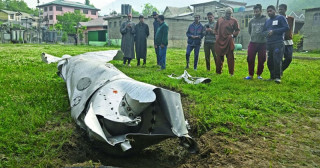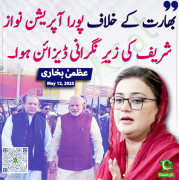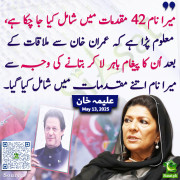uetian
Senator (1k+ posts)
Dependency syndrome
October 11, 2013 MOHAMMAD JAMIL
http://www.nation.com.pk/pakistan-n...nline/columns/11-Oct-2013/dependency-syndrome
The International Monetary Fund in its latest report on global outlook has warned that international growth will take another big hit if the US fails to raise its debt ceiling.
In a separate chapter on Pakistan and Middle East, the IMF admitted that reduction in energy subsidies and depreciation of rupee will likely result in higher inflation in Pakistan. It means that people will have to pay more for electricity and depreciation of rupee, as increase in input costs of the industries coupled with enhanced sales tax by two per cent will be passed on to the consumers. Earlier, IMF conditions for the current loan included that India be given the status of Most Favored Nation; Pakistan should import electricity from India, and exerted indirect pressure to do away with the Iran-Pakistan gas pipeline. This is tantamount to bartering away Pakistan’s sovereignty. Of course, Pakistan has already suffered enormously in the past because of the dependency syndrome.
Pakistan is indeed facing economic challenges vis-a-vis fiscal deficit, trade deficit and current account deficit. Of course, deteriorating law and order situation, corruption, flawed decisions of inept leadership in the past, energy shortfall and prohibitive cost of energy have made many industries nonviable adversely impacting exports and the exchequer. The inevitable result is that Pakistan has missed all economic targets. As regards trade deficit i.e. excess of imports over exports, Pakistan has been trying to overcome this problem for more than half a century. Yet in 2012-13 Pakistan’s imports were $40 billion and exports at $24 billion leading to trade deficit of $16 billion. It is unfortunate that despite more than $13 billion remittances annually from overseas Pakistanis during the last two years, our current account deficit was more than $3 billion. And government had to meet this shortfall and fiscal deficit through loans.
It is common knowledge that for higher growth there has to be substantial increase in investment. But the present rate of savings to GDP is around 12 per cent, which is lower if compared with the developing countries and emerging economies of the world. To give a boost to the economy, investment ratio of savings to GDP should be at least 15 per cent on the basis of ICOR 3:1, and especially when foreign investment is not forthcoming. The problem is that inflation hinders the capacity to save, as it erodes the incomes of the people, especially salaried class and fixed income groups. However, the most serious aspect of our dire economic situation is the growing public debt, which is more than 62 per cent of the GDP. Pakistan’s total debt amounts to Rs.14120 billion ($136 billion); foreign component is $60 billion and domestic debt is Rs.7880 billion ($76 billion).
It was due to the accumulation of debt-mountain that Pakistan had to allocate around more than Rs. 1000 billion for debt-servicing alone. It is unfortunate that despite being a resourceful country, Pakistan has been able to pile up such a huge public debt. In fact, we have been producing less and consuming more; earning less and spending more. It should be borne in mind that the magnitude of the public debt limits the fiscal space to invest in human development, in infrastructure, and also to enhance capacity to build a strong defence. The threats faced by Pakistan have to be understood in the light of fast changing regional and international situation, which add urgency to revive the economy so that adequate resources could be allocated to defend Pakistan’s integrity and sovereignty. It is painful to note that every government in Pakistan continued to take loans by accepting and complying with harsh IMF conditions.
Increase in the rates of utilities produces ‘the multiplier effect’, leading to cost-push inflation making it impossible for the local producers to compete in the world market. In the domestic market, people have to pay more for everything, which erodes the incomes of salaried class and fixed income groups, pushing more and more people below the poverty line. But this crisis is of our own making, as corruption has eaten into the vitals of the nation. The government should therefore restructure the public sector enterprises because on the average these state enterprises are causing of loss of more than Rs. 500 billion per year, in addition to wastage corruption, loot and plunder in other government departments, which is estimated around Rs.1000 billion per year.
If the government feels that it cannot make public sector enterprises profitable, then privatize them through transparent mechanism. Last but not the least; imports should be rationalized so that foreign exchange is not wasted on non-essential imports.
To avert the economic disaster, the government must show zero-tolerance to corruption, tax evasion, wastage and mismanagement in public sector enterprises. It should learn to live within its means and reduce the non-development expenditure by curtailing perks and privileges of cabinet members and parliamentarians. In the past, in a quest to balance the budget or to keep the fiscal deficit within reasonable limits, the axe always fell on development expenditure. If it happens, Pakistan would not be able to build infrastructure for further development and industrialization to generate employment opportunities. The government should focus on the coal-fired generation of electricity to reduce the cost of energy. On their part, the trade and industry should resort to aggressive and innovative marketing policies; look for non-traditional markets; and try to increase the exports of value-added products to overcome the trade deficit.
Original article link:
http://www.nation.com.pk/pakistan-n...nline/columns/11-Oct-2013/dependency-syndrome
SUMMARY
1. IMF current loan's terms (loan is about $6B):
1a. MFN status to India
1b. Import Electricity from India (which she creates by the stolen river-water)
1c. Don't import natural gas from Iran
2. Total debt is $136B ($60b foreign + $76B domestic)
3. Pakistan pays $10B every year for "foreign debt servicing" (interest/sood)
4. Domestic Corruption costs $10B every year.
October 11, 2013 MOHAMMAD JAMIL
http://www.nation.com.pk/pakistan-n...nline/columns/11-Oct-2013/dependency-syndrome
The International Monetary Fund in its latest report on global outlook has warned that international growth will take another big hit if the US fails to raise its debt ceiling.
In a separate chapter on Pakistan and Middle East, the IMF admitted that reduction in energy subsidies and depreciation of rupee will likely result in higher inflation in Pakistan. It means that people will have to pay more for electricity and depreciation of rupee, as increase in input costs of the industries coupled with enhanced sales tax by two per cent will be passed on to the consumers. Earlier, IMF conditions for the current loan included that India be given the status of Most Favored Nation; Pakistan should import electricity from India, and exerted indirect pressure to do away with the Iran-Pakistan gas pipeline. This is tantamount to bartering away Pakistan’s sovereignty. Of course, Pakistan has already suffered enormously in the past because of the dependency syndrome.
Pakistan is indeed facing economic challenges vis-a-vis fiscal deficit, trade deficit and current account deficit. Of course, deteriorating law and order situation, corruption, flawed decisions of inept leadership in the past, energy shortfall and prohibitive cost of energy have made many industries nonviable adversely impacting exports and the exchequer. The inevitable result is that Pakistan has missed all economic targets. As regards trade deficit i.e. excess of imports over exports, Pakistan has been trying to overcome this problem for more than half a century. Yet in 2012-13 Pakistan’s imports were $40 billion and exports at $24 billion leading to trade deficit of $16 billion. It is unfortunate that despite more than $13 billion remittances annually from overseas Pakistanis during the last two years, our current account deficit was more than $3 billion. And government had to meet this shortfall and fiscal deficit through loans.
It is common knowledge that for higher growth there has to be substantial increase in investment. But the present rate of savings to GDP is around 12 per cent, which is lower if compared with the developing countries and emerging economies of the world. To give a boost to the economy, investment ratio of savings to GDP should be at least 15 per cent on the basis of ICOR 3:1, and especially when foreign investment is not forthcoming. The problem is that inflation hinders the capacity to save, as it erodes the incomes of the people, especially salaried class and fixed income groups. However, the most serious aspect of our dire economic situation is the growing public debt, which is more than 62 per cent of the GDP. Pakistan’s total debt amounts to Rs.14120 billion ($136 billion); foreign component is $60 billion and domestic debt is Rs.7880 billion ($76 billion).
It was due to the accumulation of debt-mountain that Pakistan had to allocate around more than Rs. 1000 billion for debt-servicing alone. It is unfortunate that despite being a resourceful country, Pakistan has been able to pile up such a huge public debt. In fact, we have been producing less and consuming more; earning less and spending more. It should be borne in mind that the magnitude of the public debt limits the fiscal space to invest in human development, in infrastructure, and also to enhance capacity to build a strong defence. The threats faced by Pakistan have to be understood in the light of fast changing regional and international situation, which add urgency to revive the economy so that adequate resources could be allocated to defend Pakistan’s integrity and sovereignty. It is painful to note that every government in Pakistan continued to take loans by accepting and complying with harsh IMF conditions.
Increase in the rates of utilities produces ‘the multiplier effect’, leading to cost-push inflation making it impossible for the local producers to compete in the world market. In the domestic market, people have to pay more for everything, which erodes the incomes of salaried class and fixed income groups, pushing more and more people below the poverty line. But this crisis is of our own making, as corruption has eaten into the vitals of the nation. The government should therefore restructure the public sector enterprises because on the average these state enterprises are causing of loss of more than Rs. 500 billion per year, in addition to wastage corruption, loot and plunder in other government departments, which is estimated around Rs.1000 billion per year.
If the government feels that it cannot make public sector enterprises profitable, then privatize them through transparent mechanism. Last but not the least; imports should be rationalized so that foreign exchange is not wasted on non-essential imports.
To avert the economic disaster, the government must show zero-tolerance to corruption, tax evasion, wastage and mismanagement in public sector enterprises. It should learn to live within its means and reduce the non-development expenditure by curtailing perks and privileges of cabinet members and parliamentarians. In the past, in a quest to balance the budget or to keep the fiscal deficit within reasonable limits, the axe always fell on development expenditure. If it happens, Pakistan would not be able to build infrastructure for further development and industrialization to generate employment opportunities. The government should focus on the coal-fired generation of electricity to reduce the cost of energy. On their part, the trade and industry should resort to aggressive and innovative marketing policies; look for non-traditional markets; and try to increase the exports of value-added products to overcome the trade deficit.
Original article link:
http://www.nation.com.pk/pakistan-n...nline/columns/11-Oct-2013/dependency-syndrome
SUMMARY
1. IMF current loan's terms (loan is about $6B):
1a. MFN status to India
1b. Import Electricity from India (which she creates by the stolen river-water)
1c. Don't import natural gas from Iran
2. Total debt is $136B ($60b foreign + $76B domestic)
3. Pakistan pays $10B every year for "foreign debt servicing" (interest/sood)
4. Domestic Corruption costs $10B every year.
- Featured Thumbs
- http://afpak.foreignpolicy.com/files/india_3.jpg
Last edited:




































